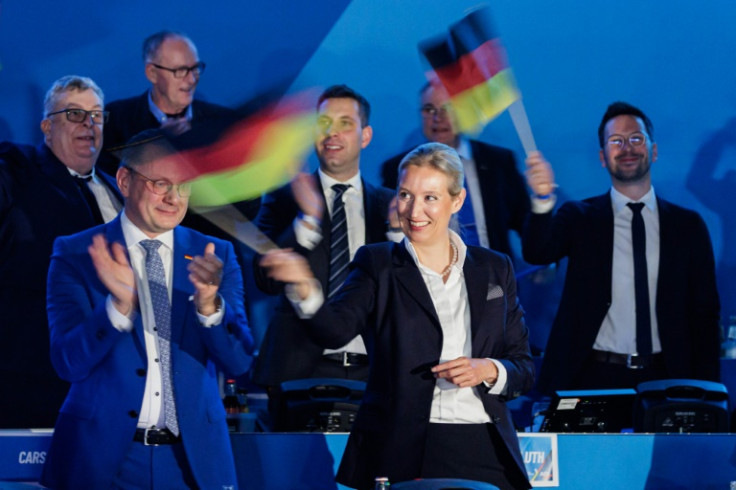After US Election, Kremlin Propagandist Sets Sights On German Vote

From a fabricated sex scandal to a fake museum heist, disinformation aimed at influencing Germany's high-stakes election is originating from dozens of AI-generated German sites apparently linked to a US fugitive turned Kremlin propagandist, researchers say.
John Dougan runs a network of more than 100 such fake sites, which mimic German media outlets, mirroring a disinformation tactic used during the American election last year, according to researchers at the German nonprofit Correctiv and the US watchdog NewsGuard.
The sites by the former Florida deputy sheriff, who fled to Russia while facing a slew of charges including extortion, are flooding the internet with content favourable to the far-right Alternative for Germany (AfD) party.
They also target mainstream parties such as Germany's Greens, whose support for Ukraine and NATO is in direct contradiction with Russian geopolitical interests.
"Dougan's case demonstrates how the Kremlin is increasingly leveraging non-Russian nationals and Western fugitives to spread propaganda, obscuring their direct involvement and evading detection," NewsGuard analyst McKenzie Sadeghi told AFP.
"Dougan's apparent efforts in Germany recycle the same tactics he used in disinformation efforts during the US election."
One of the sites called "Echo der Zeit", (Echo of Time), falsely claimed that Green party candidate Robert Habeck sexually abused a woman.
The claim, Sadeghi said, bore similarities to Dougan's campaign last year that falsely accused the former US vice-presidential contender Tim Walz of sexually assaulting a student.
Another falsehood planted on a site in Dougan's network was that Germany plans to import 1.9 million Kenyan workers, a narrative that seeks to boost the AfD's anti-immigrant sentiment.
The claim was also splashed across African news sites, an old trick Sadeghi said was used to obscure its Russian origin.
Researchers spotlighted another false claim of a 100 million euro ($105 million) corruption scandal involving missing paintings at the Berlin art museum Gemaldegalerie, which sought to implicate German politicians such as Habeck and Claudia Roth.
Dougan denies any involvement with any Russian entity, calling the assertions "made up".
"I find the Russian government to be rather useless for anything, a bunch of idiot bureaucrats who never get anything done. So, I don't know why everyone thinks I work for them," he told NewsGuard in a text message last month.
Dougan, who once served in the US Marines, has long claimed to be working independently of the Russian government.
But Western intelligence officials and disinformation researchers have linked Dougan with a Russian influence operation dubbed Storm-1516.
"From what we have observed so far, their (Storm-1516's) current approach appears to be as follows: Create a large network of fake media outlets, all of which would be updated regularly with AI-generated filler articles, then activate them by one at a time when required for a specific campaign," said the Gnida Project, an anonymous research group tracking Russian influence operations.
European intelligence documents cited by US media describe Dougan as a prolific Kremlin propagandist who is paid and directed by the GRU, Russia's military intelligence service.
"Dougan is playing the front man role in this operation," a Gnida Project member told AFP.
Germany's security services have warned that Russia and its sympathisers could step up meddling and disinformation to boost extremist parties and sow doubt about the democratic process.
Media investigations have pointed to Kremlin-linked efforts to support not just the AfD but also boost the Russia-friendly views of the far-left Alliance Sahra Wagenknecht (BSW).
Germany's interior ministry has set up a taskforce to take "necessary protection measures" against any disinformation, sabotage, espionage and cyber-attacks.
Researchers say a German government less aligned with NATO and Ukraine and more skeptical of European integration would be beneficial to Moscow's geopolitical strategy.
As the election approaches, Dougan appears poised to release more disinformation and polarising narratives.
However, his efforts with Germany were struggling to achieve the same traction as his campaigns in the United States, where his claims garnered tens of millions of views and targeted high-profile politicians.
"Unlike the US, where he was more attuned to the political climate and knew what narratives would resonate, Dougan's apparent lack of familiarity with German cultural and political nuances, coupled with a playbook that has been repeatedly exposed, has made his campaigns easier to identify and dismiss," Sadeghi said.
© Copyright AFP 2024. All rights reserved.





















